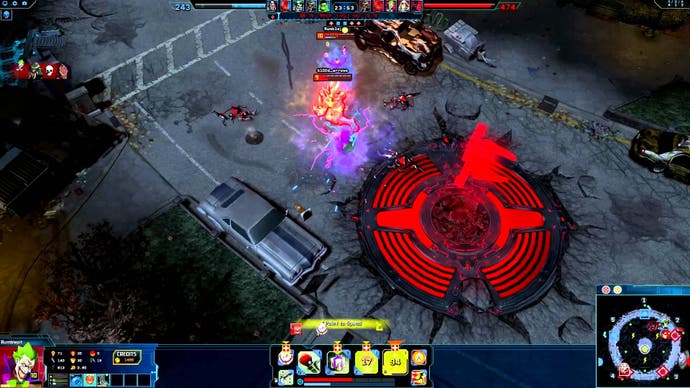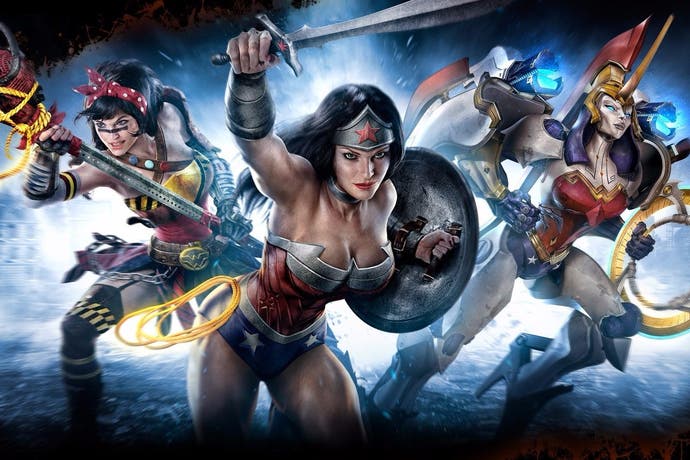Infinite Crisis review
War of the worlds.
It's said that the curse started when George Keefer Brewer died at 45 years old, in circumstances that to this day remain unclear. Brewer, an Iowa native, all broad shoulders and a wide grin, is better known for his role as the favourite son of Krypton during the first television iteration of Superman. You've probably heard his name before in the context of The Superman Curse, which today is used as shorthand to describe the terrible fate that befalls those involved in creative adaptations of the franchise.
The Superman Curse, according to the esteemed members of the press, results in death, illness and bad luck. It's all a load of crap, of course. But I think you'd be hard-pressed to argue that 30-odd years of failed Superman games doesn't look mighty curse-like. From 1978's Superman for the Atari 2600 to the Nintendo 64's Superman, considered to be one of the worst games of all time, few games starring the man of steel have ever been commercially successful.
Infinite Crisis is the latest in this troubled lineage. It's a MOBA, one of those laning battle arena games, that asks for two teams of five players to battle it out as heroes of the DC universe. It's also very loosely connected to a short-lived comic of the same name which introduces the story of multiverses and alternate dimension heroes. Against a backdrop of The Green Lantern's Coast City home, Infinite Crisis takes dozens of characters from strange and varied universes, and asks you to learn the fundamentals of MOBA play. It's a simple premise: throttle super dogs and throw cars at Batman until you find your way to the enemy base and take out their core. Warring superfolk give perfect context for the sort of mad aggression you find in MOBAs.
But it seems like Infinite Crisis arrived slightly late to this MOBA party. For one, it only recently left beta, which puts it lagging behind its rivals - League of Legends and DotA 2 have both had years to cultivate their eSports presence, whereas Turbine is still working out the back-end for Infinite Crisis. The game is pretty much unplayable in Australia because of a lack of servers, and was slow as I played it in the UK as well. While it's still early days, lag is often the greatest sin of online games, particularly as Turbine continues to ramp up its involvement in eSports.
It's also an odd time to be dipping your toes in these waters. The stability of the genre has become much less of a certainty these days. Against a backdrop of cancelled projects like EA's Dawngate, Turbine is in an uphill battle against expectation. But the studio finds its own pace in unruly terrain. Infinite Crisis sets itself apart from the fraternity of MOBA games by turning its focus to that cross-section of people who think the barriers-to-entry of MOBA gaming are too high. Here's the pitch: for those who stare slack-chinned at YouTube videos explaining the complex nature of League's meta, Infinite Crisis is for you.
Admittedly, it's a common pitch for the modern MOBA studio. Blizzard has already helped lead the push to bring MOBA's to non-MOBA players with the beta release of Heroes of the Storm. The game has become something of a model for turning notoriously hard genres into a more casual mutation. But for Turbine, the art of MOBA development is to retain some of the genre's toughest traditions while allowing the player to choose their level of involvement.
If you already know what you're doing then you'll find most of the game's features familiar. Old standards are introduced under new names. 'Stolen Powers' is a cypher for League of Legends' Summoner Spells. Two of these special abilities are chosen immediately before a match, giving you the opportunity to make use of things like Poison Ivy's Healing Wave or Superman's Superstrength against the other team.

Likewise, the studio has re-interpreted the gold collection of DotA 2 by adopting a version of "denying" - an action that keeps gold out of the pocket of your enemy. Now gold from enemy minions will fall to the ground, leaving anyone to pick it up. This includes your opponent, who can destroy it instead.
It's an interesting way of carving out an identity: Infinite Crisis innovates by taking ideas and making them slightly easier to consume. For the death-prone player, the game includes regular and fully voice-acted suggestions based on your actions. Batman explaining abstruse concepts like which lane you ought to head down based on your class: I can't imagine a better way of ingesting such vital yet dull information. It's all in the interest of teaching the audience without dumbing down the content.
But for some, the structural similarities shared between all of these MOBA's can make Infinite Crisis feel like an unnecessary addition to the pack. With only so many ways to run down a lane, this is a genre with little room for variations and Turbine's foray into this territory could never be considered radical.
Their purity of vision is admirable: it's a bridge for those who wouldn't normally play this sort of thing. But the lack of invention means it's going to struggle to pull you away from your current MOBA of choice.




